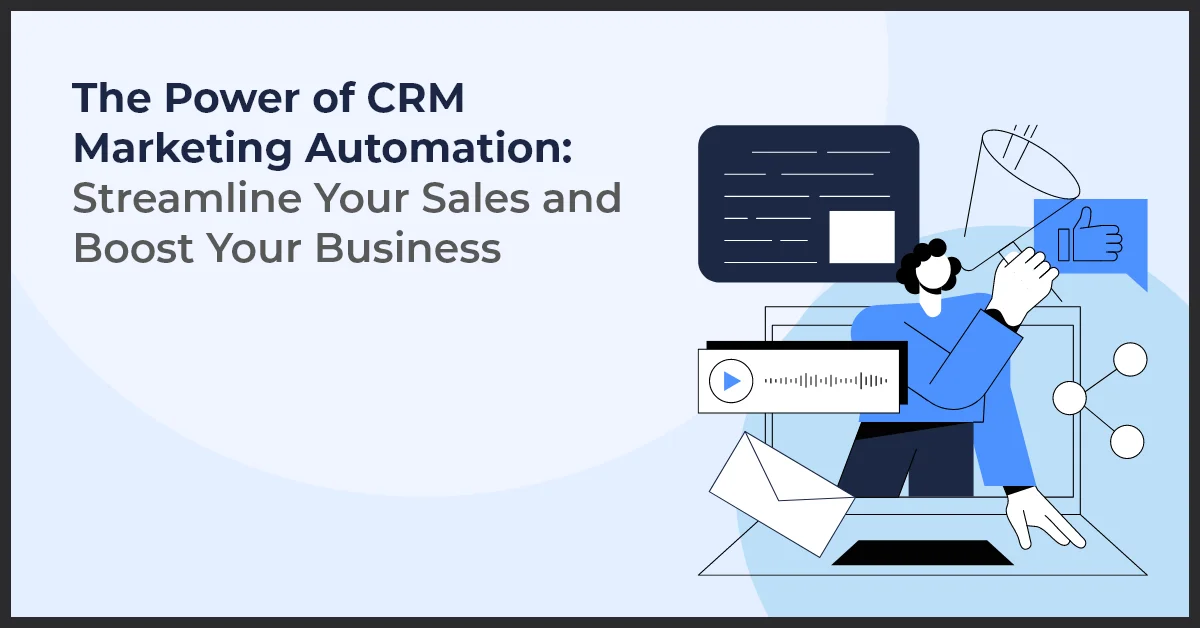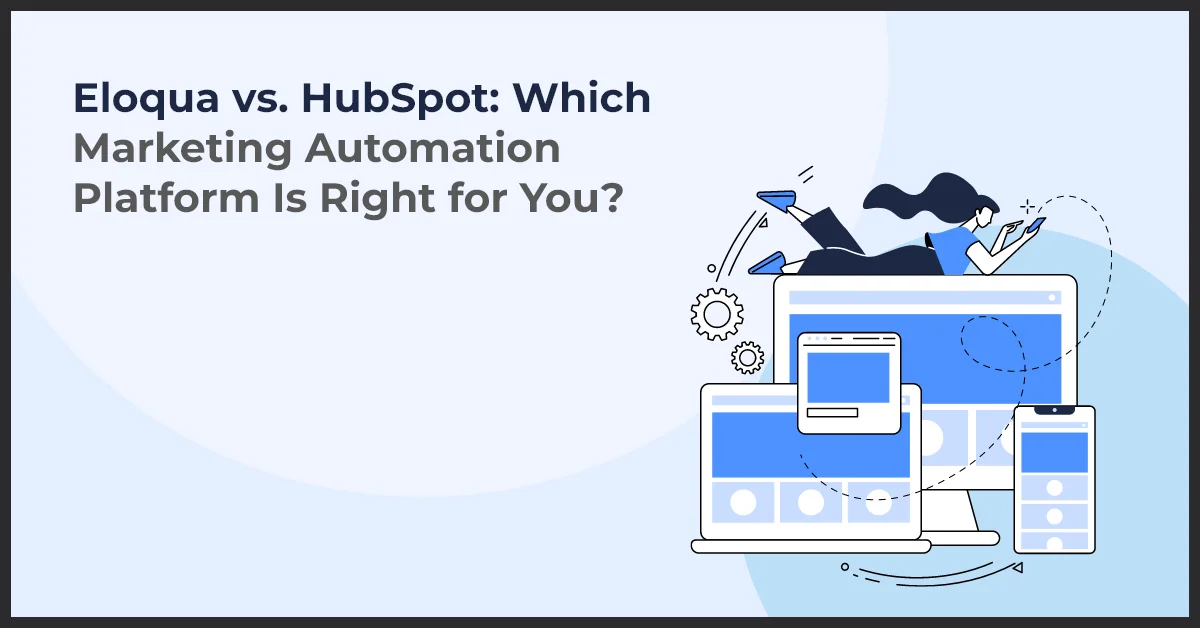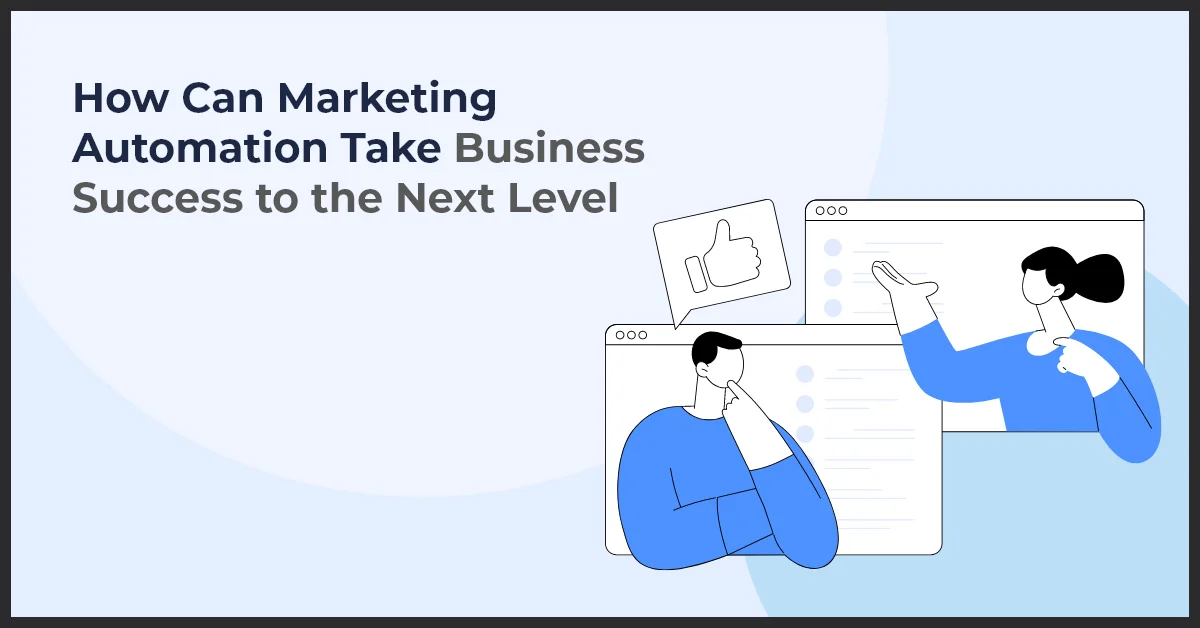The Power of CRM Marketing Automation: Streamline Your Sales and Boost Your Business

Published on: December 22, 2023
Updated on: July 01, 2024
1917 Views
- Marketing Automation
14 min read
In the realm of digital marketing, the effective management of customer relationships is key to driving growth and success. This is where CRM marketing automation comes into play. By combining the power of customer relationship management (CRM) systems and marketing automation platforms, businesses can enhance their marketing efforts and achieve remarkable results.
At its core, CRM marketing automation involves automating various repetitive tasks such as lead nurturing, email marketing, customer segmentation, and campaign management. This not only saves time and resources but also allows for a more personalized and targeted approach. By analyzing customer data and behavior, businesses can create tailored marketing campaigns that resonate with their audience, resulting in higher engagement and conversions.
CRM and marketing automation are closely associated as they both focus on building and maintaining strong customer relationships. CRM systems provide a centralized platform for businesses to track and manage customer interactions, while marketing automation platforms enable automated marketing activities. When integrated, these two powerful tools can significantly improve marketing strategies, leading to better customer acquisition, retention, and overall business growth.
With a wide range of CRM and marketing automation platforms available, it is important to choose the best marketing automation tools that align with your specific business needs and goals. These tools provide advanced features such as lead scoring, behavior tracking, and personalized content creation, enabling businesses to deliver relevant and timely messages to their customers.
In conclusion, CRM marketing automation is an essential component of successful digital marketing. By leveraging the capabilities of CRM systems and marketing automation platforms, businesses can streamline their marketing processes and create personalized experiences for their customers. So, don't miss out on the power of CRM marketing automation and explore the best marketing automation tools to enhance your marketing efforts.
The Role of CRM in Marketing Automation
CRM, or Customer Relationship Management, plays a crucial role in the effectiveness of marketing automation. By integrating CRM with marketing automation platforms, businesses can streamline processes, improve efficiency, and enhance customer interactions. Let's explore how CRM supports marketing automation strategies.
Overview of CRM and its significance in managing customer interactions and data
CRM serves as a centralized database that houses valuable customer information, including contact details, purchase history, and interactions. This data is crucial for marketing automation as it enables businesses to create targeted campaigns, personalized messaging, and improve customer engagement. With CRM, businesses can effectively manage and nurture leads, track customer interactions, and provide a seamless customer experience.
How CRM supports marketing automation processes and strategies
CRM integrates with marketing automation software to facilitate various processes and strategies, such as lead generation, customer segmentation, personalization, analytics, and campaign management. With CRM, businesses can automate repetitive tasks, nurture leads at every stage of the sales funnel, and track the effectiveness of their marketing efforts. This integration ensures that marketing and sales teams have access to real-time data, allowing for more informed decisions and increased collaboration.
Furthermore, CRM enables businesses to optimize their marketing strategies by providing insights into customer behavior and preferences. By leveraging this data, businesses can create personalized and targeted campaigns that resonate with their audience, resulting in higher conversion rates and improved customer satisfaction.
In summary, CRM plays a pivotal role in marketing automation by providing a centralized database, integrating with marketing automation platforms, and facilitating various strategies and processes. By leveraging CRM in marketing automation efforts, businesses can effectively manage customer interactions, improve efficiency, and drive meaningful results.
Marketing Automation Software and Technologies
Marketing automation software is a powerful tool that allows businesses to streamline and automate their marketing efforts. With this technology, companies can effectively manage their marketing campaigns, nurture leads, and track customer interactions. Here, we will explore the functionalities and key features of marketing automation software.
Explanation of Marketing Automation Software and its Functionalities
Marketing automation software refers to a suite of technologies that enable businesses to automate repetitive marketing tasks, such as lead nurturing, email marketing, campaign management, social media scheduling, and customer interaction tracking. This software helps organizations save time and effort by automating these processes, allowing marketers to focus on more strategic initiatives.
Overview of Key Features
- Lead Nurturing: Marketing automation software enables businesses to nurture leads through targeted and personalized communications, ensuring that prospects are engaged and moved through the sales funnel.
- Email Marketing: With marketing automation, companies can create and send automated email campaigns, delivering relevant content to their audience at the right time.
- Campaign Management: This software allows businesses to plan, execute, and track their marketing campaigns across various channels, ensuring consistency and effectiveness.
- Social Media Scheduling: Marketing automation tools provide the capability to schedule and automate social media posts, helping businesses maintain an active presence on social platforms.
- Customer Interaction Tracking: By tracking customer interactions, businesses can gain valuable insights into their audience's behavior and preferences, allowing for more targeted marketing efforts.
Overall, marketing automation software offers a range of functionalities that enhance marketing efficiency and effectiveness. By automating repetitive tasks and providing valuable insights, this technology empowers businesses to drive engagement, nurture leads, and ultimately, achieve their marketing goals.
Lead Generation and Management in CRM Marketing Automation
Lead generation and management are crucial components of CRM marketing automation. In this section, we will explore the definition and importance of lead generation and management, and how CRM marketing automation facilitates effective lead generation and nurtures leads throughout the sales funnel.
Definition and Importance of Lead Generation and Management
Lead generation refers to the process of attracting and capturing potential customers, also known as leads, who have shown interest in your products or services. It involves various marketing strategies, such as content marketing, social media marketing, email marketing, and more, to gather information about potential customers and initiate contact.
Lead management, on the other hand, involves the systematic tracking, nurturing, and organization of leads to ensure effective communication and follow-up. It focuses on converting these leads into paying customers by providing them with relevant information, addressing their concerns, and guiding them through the sales funnel.
Both lead generation and management are critical for businesses as they help identify potential customers, increase brand awareness, and ultimately drive sales. By implementing CRM marketing automation, businesses can streamline and optimize these processes, resulting in greater efficiency and effectiveness.
How CRM Marketing Automation Facilitates Effective Lead Generation and Nurtures Leads Throughout the Sales Funnel
CRM marketing automation software, powered by advanced technologies, offers several features that enable efficient lead generation and management:
- Email Campaigns: CRM marketing automation allows businesses to create and send targeted email campaigns to a segmented audience. By personalizing content based on customer preferences and behavior, businesses can capture the attention of potential leads and nurture them through the sales funnel.
- Lead Scoring: With CRM marketing automation, businesses can assign scores to leads based on their behavior, demographics, and engagement level. This helps prioritize leads and focus efforts on those with the highest potential for conversion.
- Lead Tracking: CRM marketing automation tracks the activities and interactions of leads, providing businesses with valuable insights into their behavior and preferences. This data helps businesses tailor their communication and offerings to meet the specific needs of each lead.
- Automated Workflows: By creating automated workflows, businesses can set up a series of actions triggered by specific events or criteria. This allows for personalized, timely follow-ups with leads, ensuring no opportunity is missed and nurturing them towards a purchasing decision.
Overall, CRM marketing automation empowers businesses to generate high-quality leads, nurture them effectively, and guide them through the sales funnel. By leveraging advanced technologies and automation capabilities, businesses can improve lead conversion rates, increase customer satisfaction, and drive revenue growth.
Customer Segmentation with CRM Marketing Automation
Customer segmentation is the process of dividing a company's customers into distinct groups based on specific criteria. This allows businesses to understand their customer base better and tailor their marketing efforts to specific segments.
With CRM marketing automation, businesses can take customer segmentation to a whole new level. By using advanced algorithms and data analysis, CRM software enables businesses to identify different customer segments based on demographics, behaviors, preferences, and purchase history.
Once the customer segments are identified, CRM marketing automation allows businesses to create personalized and targeted marketing campaigns for each segment. By delivering relevant content and offers to specific segments, businesses can significantly improve their marketing effectiveness and drive higher conversion rates.
Furthermore, CRM marketing automation provides businesses with the ability to automate the segmentation process. Instead of manually classifying customers into segments, the CRM software can automatically assign customers to their respective segments based on predefined rules and criteria.
This automation not only saves time and effort but also ensures accuracy and consistency in the segmentation process. Businesses can continuously analyze and update customer segments based on real-time data, further optimizing their marketing strategies.
Overall, customer segmentation with CRM marketing automation empowers businesses to understand their customers better, deliver personalized experiences, and ultimately, drive business growth.
Personalization in CRM Marketing Automation
Personalization is a crucial aspect of any successful marketing effort. It allows businesses to connect with their customers on a deeper level and create a more meaningful and relevant experience for each individual.
With CRM marketing automation, businesses have the power to deliver personalized messages and offers to their customers based on their behaviors, preferences, and interests. This level of personalization not only helps to build a stronger customer relationship but also significantly improves the effectiveness of marketing campaigns.
By leveraging data collected through CRM marketing automation, businesses can analyze customer interactions, purchasing history, and engagement patterns to understand individual needs and preferences. Armed with this information, businesses can tailor their messages and offerings to meet each customer's specific interests and desires.
For example, a customer who has previously shown interest in a particular product can be targeted with personalized recommendations and exclusive offers for that specific product. This level of personalization not only enhances the customer experience but also increases the likelihood of conversion and repeat purchases.
Furthermore, CRM marketing automation also allows businesses to automate the delivery of personalized messages and offers at the optimal time. By leveraging automation, businesses can ensure that each customer receives the right message at the right time, regardless of the size of their customer base.
Personalization in CRM marketing automation is not limited to just email communications. Businesses can also leverage personalization in other channels, such as social media, SMS, and website content. This multi-channel personalization approach helps to create a consistent and seamless experience for customers across various touchpoints.
In conclusion, personalization plays a critical role in CRM marketing automation. It enables businesses to deliver targeted and relevant messages and offers to individual customers, which not only enhances the customer experience but also drives higher engagement, conversion, and retention rates.
Multichannel Marketing with CRM Marketing Automation
As businesses strive to reach their target audience and stay ahead of the competition, multichannel marketing has emerged as a necessity. With the advent of technology, consumers now interact with brands through various channels such as email, social media, websites, and mobile apps. This has led to a shift in the way businesses approach their marketing strategies.
Multichannel marketing refers to the practice of utilizing multiple communication channels to engage and connect with customers. By leveraging CRM marketing automation, businesses can effectively carry out multichannel marketing campaigns and achieve their goals.
Utilizing CRM marketing automation enables businesses to engage with customers across various channels seamlessly. The software allows businesses to automate their marketing activities, ensuring consistent messaging and branding across different touchpoints.
One of the primary benefits of multichannel marketing with CRM marketing automation is improved customer engagement. By reaching out to customers through their preferred channels, businesses can establish stronger connections, build trust, and increase the likelihood of conversions.
Furthermore, multichannel marketing enables businesses to maximize their reach and visibility. By utilizing different communication channels, businesses can expand their audience and interact with a wide range of potential customers. This increases brand exposure and creates more opportunities for customer acquisition.
Another advantage of multichannel marketing with CRM marketing automation is the ability to deliver personalized experiences. With the help of CRM data, businesses can tailor their marketing efforts to each individual customer, based on their preferences, behaviors, and purchase history. This level of personalization enhances customer satisfaction and drives higher conversion rates.
In addition to these benefits, multichannel marketing with CRM marketing automation also allows businesses to track and analyze their marketing efforts effectively. The software provides comprehensive analytics and reporting capabilities, enabling businesses to measure the success of their campaigns, identify trends, and make data-driven decisions.
In conclusion, multichannel marketing, combined with the power of CRM marketing automation, offers businesses a strategic advantage in engaging with customers. By leveraging various communication channels and automating marketing activities, businesses can build stronger connections, increase brand visibility, deliver personalized experiences, and drive measurable results.
Campaign Management in CRM Marketing Automation
In CRM marketing automation, campaign management refers to the comprehensive process of planning, executing, and tracking marketing campaigns. With the help of automation software, businesses can streamline their campaign management and achieve greater efficiency and effectiveness.
Overview of Campaign Management in CRM Marketing Automation
Campaign management involves the creation and management of various marketing campaigns, such as email campaigns, social media campaigns, and events. By utilizing CRM marketing automation, businesses can automate and streamline the entire campaign management process.
Automation software allows businesses to plan their campaigns in advance, set up different touchpoints, and define triggers for automated actions. This not only saves time but also ensures consistency in messaging and customer experiences throughout the campaign.
Furthermore, CRM marketing automation enables businesses to execute their campaigns effectively by delivering targeted and personalized messages to the right audience at the right time. By leveraging customer data and segmentation capabilities, businesses can create highly relevant and tailored campaigns that result in higher engagement and conversion rates.
Tracking the performance and success of marketing campaigns is another crucial aspect of campaign management. CRM marketing automation provides businesses with powerful analytics and reporting tools to monitor key metrics, track customer interactions, and measure the impact of their campaigns. This data-driven approach allows businesses to optimize their campaigns, make data-backed decisions, and drive better marketing ROI.
How Businesses Can Plan, Execute, and Track Marketing Campaigns Effectively Using Automation Software
When it comes to planning marketing campaigns with CRM marketing automation, businesses can start by defining their campaign objectives and goals. They can then segment their target audience based on various attributes, such as demographics, previous interactions, or purchase history.
Next, businesses can design and create their campaign assets, such as email templates, landing pages, or social media posts. With CRM marketing automation, these assets can be easily customized and personalized based on the audience segments, ensuring a consistent and compelling brand experience across various channels.
Once the campaign assets are ready, businesses can use automation software to schedule and automate the delivery of their messages. By setting up triggers and workflows, businesses can ensure that the right messages are sent to the right people at the right time, without manual intervention.
Throughout the campaign, businesses can track key metrics, such as open rates, click-through rates, or conversion rates, using the analytics and reporting capabilities of CRM marketing automation. This real-time data allows businesses to monitor the performance of their campaigns, identify areas for improvement, and make necessary adjustments to optimize results.
In conclusion, campaign management in CRM marketing automation is a powerful tool for businesses to plan, execute, and track their marketing campaigns effectively. By leveraging automation software, businesses can streamline their processes, deliver targeted messages, and achieve better marketing outcomes.
Conclusion
In the ever-evolving symphony of customer engagement, the integration of CRM and Marketing Automation stands as a crescendo of strategic acumen. This symbiotic alliance propels organizations into a realm where customer relationships are not just managed but elevated to an art form. As we navigate the currents of innovation, the compass points towards a future where data-driven precision and personalized engagement converge, reshaping the landscape of CRM Marketing Automation. Organizations that embrace this paradigm shift are poised not just to survive but to thrive in the dynamic landscape of modern business.



